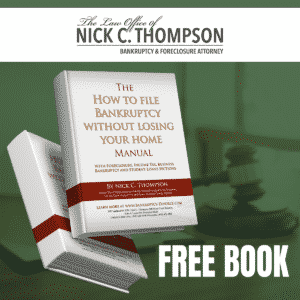Now that you’re well into your Chapter 13 bankruptcy and making your payments on time, there is still information you need to know about common Chapter 13 problems and issues that arise. You also need to know how to deal with these problems. Of course, it’s best to educate yourself as much as possible when filing for bankruptcy. A good place to start is with our Bankruptcy Manual where you will find answers to many of your questions. This helps prepare you in advance so that you know what to do when something “happens.”
Common Chapter 13 Problems and Issues After Successfully Filing Bankruptcy
Difficult things happen such as divorce, disability, or job loss. More to the point, it’s relatively easy for problems to happen that cause you to fall behind on the plan payments to the trustee. However, if you fall behind, you leave yourself wide open for the trustee to file a motion to dismiss the case. Then, if the case dismisses for the failure to make plan payments it is possible to refile a second case.
But, when you file a second case within six months you have to show a good reason to extend the automatic stay. You must also know that if you file a third case within a year, there is no automatic stay. You might be able to file a motion to impose the automatic stay but, your chances are slim. Moreover, it most likely will not stop the sale of a home or repossession of an automobile.
⎆ Motion to terminate the stay for failure to pay a mortgage or car loan.
If you thought the failure to pay plan payments was bad then this is just as bad or worse. First, the attorney for the mortgage company is quite happy to show the judge you are not making timely payments on the mortgage. However, a motion to terminate the stay is a request to allow the creditor to file a foreclosure or repossess an auto. If this your chosen course of action, it costs about $200 for the filing fee and $750 to $1,000 in attorney fees. So, if you fall behind you have to pay the mortgage company for this motion. Of course, if you avoid falling behind they don’t have to file it.
At any rate, that is a very large late charge. Fall behind a second or third time and the stay will be often be terminated automatically. In fact, there will be no hearing and the home goes straight to foreclosure court. What you need to know first is that your plan payments and mortgage payments start the month you file for bankruptcy. Therefore, it is common for people to not make the payments the month they file. This means as soon as the plan is confirmed a debtor might already be one or two months behind in payments.
⎆ Motion to dismiss by the debtor as Chapter 13 problems.
Just because your home goes back into foreclosure in state court does not mean your Chapter 13 case is over. In other words, your case in bankruptcy court does not close just because the mortgage company files a motion to terminate the stay. The only reason you file for bankruptcy might be to save your home. But the plan continues to take out payments until you dismiss the case.
There is also a penalty if you dismiss your own case after a motion to terminate the stay. However, if you dismiss your own case after a motion to terminate the stay or a willful violation you cannot file again for six months. At that point, staying in the case makes no sense, and refiling seems the thing to do. But, you have to do it quickly or you will lose the home.
⎆ Failure to file budget or turnover tax refunds as common Chapter 13 problems and issues.
Every year the debtor must file a budget and turnover his tax refund with our trustee in the Western district of Kentucky. This is not the rule in other districts like Indiana. However, in Indiana, the debtor has a statutory duty to make his or her best efforts to repay the plan. Since tax refunds, inheritances, and lottery winnings are not part of your normal budgeted income they must be turned over to repay creditors. If you increase your withholding to the normal number of exemptions plus one or two more exemptions you will lose little or none of your refund. Additionally, if you properly budget for savings you won’t have a tax refund anyway.
You should probably refer to your schedule I and J when you prepare your annual budget. If your income increases a lot your plan payments may increase. Normally when your income increases so do the food budget and other items. However, the plan payment does not increase unless there is a very large income increase.
Here is an exhaustive checklist to prevent you from having problems and what you need to know if you are filing a Chapter 13 in Western Kentucky.
 Resources for Bankruptcy
Resources for Bankruptcy
Louisville Kentucky Bankruptcy Forms
How to Keep Tax Refunds in Chapter 7 or 13 Bankruptcy
Fraud, Stay, and Discharge Adversary Complaints
Options to Avoid Foreclosure with Bankruptcy
Annual Budgets and Tax Refunds in Bankruptcy
How to Avoid Mortgages & Strip Liens
If you are thinking about filing bankruptcy, don’t delay because timing is crucial. I am here to help you. So, contact my office right away to start the conversation. Nick C. Thompson, Bankruptcy Lawyer: 502-625-0905.



